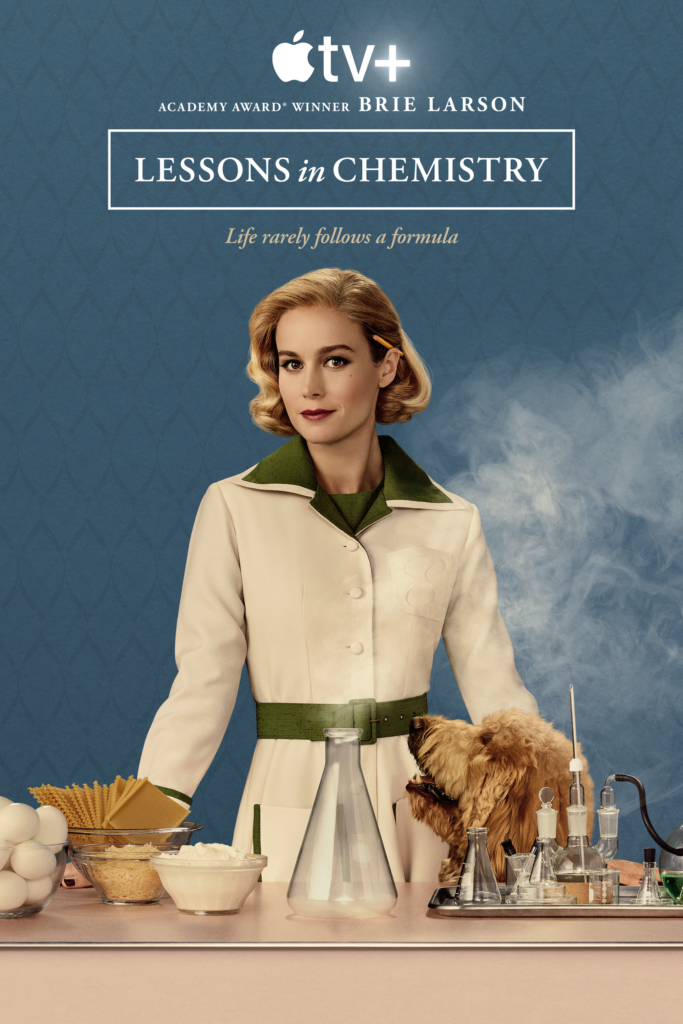A Must-Watch or A Must-Read for Working Women
When I first picked up Bonnie Garmus‘s “Lessons in Chemistry” last year. I was instantly captivated. It wasn’t just another book; it became my favorite for the last decade, resonating deeply through its pages. Remarkably, when it transitioned to the screen, it preserved that powerful emotional connection, delivering the same heartbeats and evoking the same tears I experienced while reading. This is a rare gem that working women and anyone looking for deep, emotional storytelling should not miss.
A Tale of Empowerment and Resilience
Set in the 1960s, “Lessons in Chemistry” chronicles the life of Elizabeth Zott, a chemist navigating a male-dominated industry. Her story is not just a narrative; it’s an anthem of defiance against the confinements of societal expectations. Elizabeth’s journey from the lab to the small screen, where she teaches cooking through the lens of science, serves as a metaphor for breaking barriers and asserting one’s rightful place in any area of life. This story encourages all of us, especially working women, to pursue our dreams relentlessly despite our obstacles.
Breaking Stereotypes with Grace and Wit
Elizabeth Zott is not your typical heroine. She dismantles the clichéd notion that women must choose between career and family or conform to traditional roles. Her life is a testament to defining one’s own path and success, making her a beacon for many working women today. This character teaches us that our value is not dictated by our adherence to outdated norms but by our skills, intelligence, and perseverance.
The Universal Language of Science and Emotion
What sets “Lessons in Chemistry” apart is how it weaves science into the fabric of everyday life, making profound connections between cooking and chemistry—both arts requiring precision, creativity, and an experimental spirit. This elevates what is traditionally seen as women’s work and celebrates the intellectual rigor involved in both disciplines. The book and its screen adaptation engage the mind and heart, reminding us that pursuing science or any profession can be a profound and passionate journey.
Humor, Heart, and Human Connections
Despite the weight of its themes, “Lessons in Chemistry” infuses humor and warmth into Elizabeth’s story, making her experiences both accessible and endearing. The emotional richness of the narrative ensures that it touches the hearts of its audience, making every laughter, tear, and triumph feel personal and real.
A Community of Support
The story also highlights the importance of solidarity and support among women. Elizabeth’s friendships and alliances are pivotal, underscoring the impact a supportive community can have on personal and professional growth. For many working women, these relationships are the backbone of resilience and success.
Personal Reflection
Reading and watching “Lessons in Chemistry” was a profoundly moving experience, filled with moments of joy, pain, and triumph that echoed the emotional depth of my life experiences. It celebrates intellect, determination, and the unyielding spirit of women everywhere. Both the book and its adaptation do more than tell a story—they inspire, motivate, and resonate on a deeply personal level, making “Lessons in Chemistry” a heartfelt recommendation for anyone who seeks to be moved and empowered.
What can we learn from “Lessons in Chemistry”?
“Lessons in Chemistry” by Bonnie Garmus offers many lessons through its captivating narrative and complex characters, particularly the protagonist, Elizabeth Zott. As readers and viewers, here’s what we can learn from this engaging story.
Pursue Your Passion Relentlessly: Elizabeth Zott’s unwavering commitment to her love of chemistry, despite societal pushback and personal setbacks, teaches us the importance of pursuing our passions relentlessly. Her dedication serves as a reminder that following your interests can lead to fulfillment and change for oneself and the wider community.
Challenge Societal Norms: Set in a time when women were often sidelined in scientific and professional fields, Elizabeth challenges the gender biases and societal expectations placed on her. Her story encourages us to question and push against outdated norms and advocate for a society where everyone can thrive based on their merits, regardless of gender.
The Value of Resilience: Elizabeth faces numerous obstacles throughout the book, from professional discrimination to personal tragedies. Her resilience—her ability to persevere in these challenges—is a powerful lesson in not allowing setbacks to define or derail our paths.
Science as a Lens for Viewing the World: The novel cleverly uses chemistry as a metaphor for life, illustrating that, like chemical reactions, life events can be unpredictable yet understandable through observation and learning. This perspective encourages a rational, curious approach to life’s challenges and mysteries.
Importance of Independence: Elizabeth’s independence is central to her character. Her financial, intellectual, and emotional autonomy allows her to make the right choices, teaching us the importance of building and maintaining independence in various life aspects.
Solidarity and Support Networks: “Lessons in Chemistry” also highlights the strength that can be found in solidarity and support networks, particularly among women. Elizabeth’s friendships provide her with emotional support and practical help, underscoring the value of community and collaboration in overcoming adversity.
Breaking Down Stereotypes: Elizabeth breaks down stereotypes about what women can and should do by excelling in a male-dominated field and combining her roles as a scientist, mother, and television host. This aspect of the story invites us to reevaluate our own perceptions of gender roles and capabilities.
Educational Empowerment: Elizabeth uses her television show as a platform to educate women on chemistry through cooking, demonstrating that education can be both empowering and transformative. Her approach to teaching shows how knowledge can be used to challenge and change societal norms.
Balancing Personal and Professional Life: The story does not shy away from the complexities of balancing personal desires with professional ambitions, especially as a single parent. It presents a realistic view of the struggles and rewards of managing multiple roles, providing a nuanced take on work-life balance.
Emotional Intelligence: Elizabeth’s journey is not just one of external success but also internal growth. Her interactions with others and her introspective moments reveal the importance of emotional intelligence—understanding and managing one’s emotions and those of others.
In sum, “Lessons in Chemistry” is rich with insights about life, resilience, and the power of knowledge. It is a poignant reminder that while the path may be fraught with challenges, determination and a robust support system can lead to profound personal and societal change.
Here are ten reasons to start “Lessons in Chemistry,” whether through the pages of the book or the scenes of its screen adaptation:
Inspirational Protagonist: Elizabeth Zott, the central character, is a trailblazer in a male-dominated science field in the 1960s, making her story a powerful source of inspiration for women in any profession today.
Empowerment: The story promotes female empowerment by highlighting Elizabeth’s fight against societal expectations and refusal to conform to traditional gender roles.
Intellectual Engagement: The narrative cleverly uses chemistry and cooking as metaphors to explore deeper themes of creativity, precision, and systematic thinking, appealing to anyone with a curious, analytical mind.
Historical Insight: Set during a pivotal era for women’s rights, the story provides insightful historical context on the challenges and changes in women’s roles during the 1960s.
Humor and Heart: Despite its serious themes, “Lessons in Chemistry” is infused with humor and warmth, making it enjoyable and accessible to a wide audience.
Universal Themes: The book and show tackle universal themes such as resilience, love, and the pursuit of justice, ensuring something relatable for every viewer or reader.
Stellar Writing and Production: Bonnie Garmus’s engaging writing style, combined with high production values in the adaptation, ensures a quality experience in both reading and viewing.
Impactful Life Lessons: Beyond its entertainment value, the story contains meaningful life lessons about independence, self-respect, and challenging the status quo.
Strong Supporting Characters: The narrative is enriched by a cast of well-developed supporting characters who add depth and diverse perspectives to the story.
Motivational: “Lessons in Chemistry” is not just a book or a show—it’s a motivational journey that encourages every woman to question, dream, and dare to change her world. It’s a reminder that your potential is limitless and not defined by your circumstances.
Whether you read “Lessons in Chemistry” or watch its adaptation, you will find a resonant, empowering, and intellectually stimulating experience.

Cast & Crew
Brie Larson, Aja Naomi King, Stephanie Koenig, Patrick Walker
Showrunner
Lee Eisenberg
Executive Producers
Lee Eisenberg, Susannah Grant, Brie Larson, Jason Bateman, Michael Costigan, Natalie Sandy, Louise Shore







